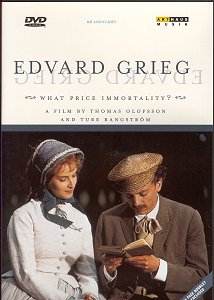The concept of this 1999 Norwegian production, based
on the troubled life of Grieg, is worthy enough. It uses two of his
compositions, both very personal: the Ballade and the String Quartet,
shown played in full before an unenthusiastic audience of publisher’s
reviewers. This concept is used as a background to a series of flashbacks
as the elderly Grieg looks back over his turbulent life. I surmise that
in trying to satisfy an international audience, the producers decided
to eschew any commentary and dialogue in favour of an occasional quotation
from the off-screen "voice of Grieg." The trouble is that
these quotes, spoken in such a whisper, and in over-awed tones by Derek
Jacobi, are so infrequent that they are of limited assistance in fathoming
out the story to one’s complete satisfaction. Too much is left to the
imagination. For instance, we recognise - just – glimpses of Tchaikovsky,
Liszt and Brahms (the latter, I think, rather puzzlingly holding a paint
brush) in salons and other gatherings, but there is little, or no explanation
of their significance in Grieg’s story
The photography is sumptuous: beautiful views of Norway,
Germany, Italy and Denmark. Staffan Scheja is persuasive in his mute
acting role as Grieg, as a man, (Philip Branmer plays the boy Grieg)
but he is constantly upstaged by the more animated and beautiful Claudia
Zöhner as his long suffering and neglected wife Nina. The music
is sensitively blended with the on-screen story taking us jerkily backwards
and forwards through the composer’s life. We witness Grieg’s boyhood,
his loving relationship with his mother who was also his first music
teacher, and the overshadowing jealousy of his brother John. We see
his student days and his close friendship with Rikard Nordraak who died
tragically young in Berlin, and his love affair and subsequent marriage
to his cousin Nina Hagerup. The scenes of their courtship are lyrical
and beguiling. But the music becomes anguished as the on-screen images
show death taking his parents and the infant child he adores, and as
he realises Nina’s infidelity. The music is disturbed as he himself
succumbs to the painter Sabine Oberhorner and as Grieg’s obsession with
his music and his busy touring schedules deepens and becomes all pervasive.
You are left with an impression of a life unfulfilled – as Grieg, himself,
put it "a life fractured" by so much tragedy.
A worthy concept filmed in glorious locations with
more than acceptable mute acting but just that bit too enigmatic for
complete satisfaction.
Ian Lace

![]() Edvard Grieg………………..Staffan
Scheja and Philip Branmer
Edvard Grieg………………..Staffan
Scheja and Philip Branmer ![]()
![]() ARTHAUS
MUSIK DVD Video 100 236 [77 mins]
ARTHAUS
MUSIK DVD Video 100 236 [77 mins]